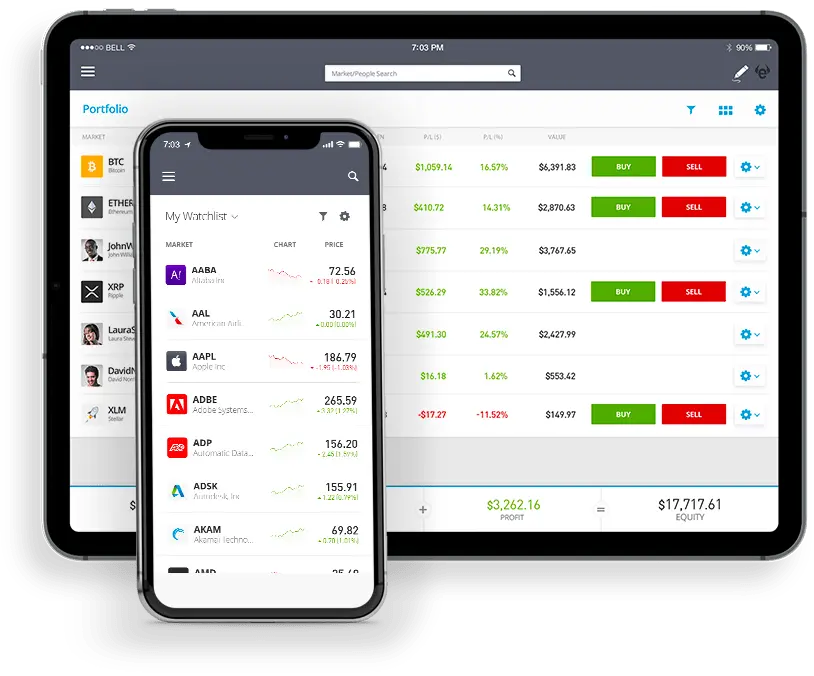eToro users in Germany are required to undergo additional verification through video or bank identification to trade crypto due to regulatory requirements. This process ensures adherence to the stringent financial and organizational standards set by BaFin, Germany's Federal Financial Supervisory Authority. This extra layer of verification is designed to enhance the security of transactions and protect users from unreliable crypto service providers.
Open an account!
61% of retail investor accounts lose money when trading CFDs with this provider. You should consider whether you can afford to take the high risk of losing your money.
As a resident of Germany and an active user of eToro, I've navigated through the unique requirements set for trading cryptocurrencies on the platform. My firsthand experience with these processes allows me to shed light on why eToro in Germany necessitates additional steps like video or bank identification for crypto trading. This article aims to give some clarity about these these requirements and provide insights into how they impact your trading experience on the platform.
What's with the Additional Verification Process?
If you have an account with this platform and residing in Germany, you need to face a distinct set of verification processes beyond the standard account setup. This includes either:
- A bank identification, facilitated through Solaris, or;
- A video identification process via IDnow
This step becomes mandatory when you attempt to do any of the following:
- Open a crypto position
- Copy other traders
- Invest in Smart Portfolios containing crypto
- Use the eToro Money Crypto wallet
From my experience, although this might seem like an extra hurdle, it's actually a straightforward process. In fact, this significantly enhances the security of your transactions and account.
The Role of BaFin in Cryptoasset Custody
The custody of cryptoassets in Germany is not just a matter of platform policy but is regulated under national financial laws. BaFin, Germany's Federal Financial Supervisory Authority, plays a crucial role in this. It ensures that eToro Germany adheres to stringent financial and organizational standards.
This regulation is pivotal in safeguarding German customers from unreliable crypto service providers. As a user, knowing that BaFin supervises these operations provides a sense of security and trust in the platform's operations.
Its Impact on Trading Activities
The requirement for additional identification directly influences various trading activities on eToro. Initially, I found it slightly cumbersome when I wanted to quickly dive into crypto trading.
However, I soon realized that this process is integral to ensuring a safe trading environment. It's a one-time process anyway and after that, it opens up a range of activities, from trading in cryptocurrencies to exploring diverse portfolios, all while ensuring that my account and this platform is compliance with German financial regulations.
Essential Insights
- Enhanced Security: The additional verification process, though initially seeming cumbersome, plays a crucial role in enhancing the security and integrity of your trading activities.
- Regulatory Compliance: The involvement of BaFin in overseeing cryptoasset custody ensures that eToro operates within the bounds of German financial regulations, offering a layer of protection to its users.
- Access to Diverse Trading Options: Once the verification is complete, German users have full access to a range of crypto trading options on the platform, from individual trades to copying strategies of experienced traders.
Here's my final take on this:
While it may add an extra step to the initial setup process, it ultimately serves to protect the interests of the traders and ensure a safe, regulated trading environment. As a German resident who has gone through this process, I can affirm that the added security and compliance are worth the initial effort.
eToro is a multi-asset platform which offers both investing in stocks and cryptoassets, as well as trading CFDs.
Please note that CFDs are complex instruments and come with a high risk of losing money rapidly due to leverage. 61% of retail investor accounts lose money when trading CFDs with this provider. You should consider whether you understand how CFDs work, and whether you can afford to take the high risk of losing your money.
This communication is intended for information and educational purposes only and should not be considered investment advice or investment recommendation. Past performance is not an indication of future results.
Copy Trading does not amount to investment advice. The value of your investments may go up or down. Your capital is at risk.
Don’t invest unless you’re prepared to lose all the money you invest. This is a high-risk investment and you should not expect to be protected if something goes wrong. Take 2 mins to learn more.
Crypto investments are risky and may not suit retail investors; you could lose your entire investment. Understand the risks here https://etoro.tw/3PI44nZ.
eToro USA LLC does not offer CFDs and makes no representation and assumes no liability as to the accuracy or completeness of the content of this publication, which has been prepared by our partner utilizing publicly available non-entity specific information about eToro.


